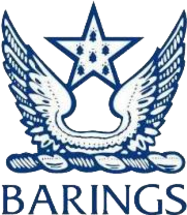Barings Bank
 |
|
| Industry | Banking |
|---|---|
| Fate | Collapsed (Purchased for £1 by ING). |
| Successor |
ING Group Baring Asset Management |
| Founded | 1762 |
| Founder | Sir Francis Baring |
| Defunct | February 26, 1995 |
| Headquarters | London |
Barings Bank was a British merchant bank based in London, and the world's second oldest merchant bank (after Berenberg Bank). It was founded in 1762 and was owned by the German-originated Baring family of merchants and bankers.
The bank collapsed in 1995 after suffering losses of £827 million ($1.3 billion) resulting from poor speculative investments, primarily in futures contracts, conducted by an employee named Nick Leeson working at its office in Singapore.
Barings Bank was founded in 1762 as the John and Francis Baring Company by Francis Baring, with his older brother John Baring as a mostly silent partner. They were sons of John (né Johann) Baring, wool trader of Exeter, born in Bremen, Germany. The company began in offices off Cheapside and within a few years moved to larger quarters in Mincing Lane. Barings gradually diversified from wool into many other commodities, providing financial services necessary for the rapid growth of international trade. By 1790, Barings had greatly expanded its resources, both through Francis' efforts in London and by association with leading Amsterdam bankers Hope & Co. In 1793, the increased business necessitated a move to larger quarters in Devonshire Square. Francis and his family lived upstairs, above the offices.
In 1800, John retired and the company was reorganized as Francis Baring and Co. Francis' new partners were his eldest son Thomas (later to be Sir Thomas Baring, 2nd Baronet) and son-in-law Charles Wall. Then, in 1802, Barings and Hope were called on to facilitate the largest land purchase in history - the Louisiana Purchase. This was accomplished despite the fact that Britain was at war with France and the sale had the effect of financing Napoleon's war effort. Technically, the United States purchased Louisiana from Barings and Hope, not from Napoleon. Baring was willing to help Napoleon in the short term, however, because he, and British politicians who backed him, wagered American expansion into Louisiana would mean what was now becoming a familiar formula involving the extermination of native populations, the importation of Africans as slaves, and the production and export of cotton to the whirring British mills around Manchester. In other words, American slavery would ensure Baring's profits in Britain. After a $3 million down payment in gold, the remainder of the purchase was made in U.S. bonds, which Napoleon sold to Barings through Hope and Company of Amsterdam at a discount of 87½ per $100. Francis' second son Alexander, working for Hope & Co., made the arrangements in Paris with François Barbé-Marbois, Director of the Public Treasury. Alexander then sailed to the United States and back to pick up the bonds and deliver them to France.
...
Wikipedia
